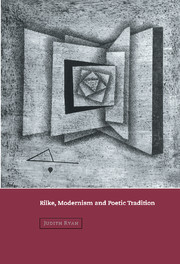Introduction: Rilke's writing desk
Published online by Cambridge University Press: 22 September 2009
Summary
When Rilke's older friend Ellen Key, a well-known Swedish social reformer, wrote to him that his poetry smacked of the writing desk, she meant that it was too meagrely rooted in actual experience. She thought of poetry as the result of personal suffering, and she wished her friend Rilke had had more of it. Rilke himself thought he suffered quite enough: he had been a lonely little boy and he led a somewhat isolated adult life. Whenever real experiences loomed, he shied away from them: from building a life with his wife and baby daughter, from the troubling events of his trip down the Nile, and from service at the front during the First World War. Still, at the end of his life, when he had to endure the terrible pains of leukemia, he refused heavy doses of drugs that would prevent him from fully experiencing his suffering. His final poem, an expression of this suffering, is devastating to read; but in formal respects it is also a highly literary production.
Lack of personal experience is not the only reason for the ‘writing desk’ effect. Part of it comes from Rilke's use of unusual vocabulary, his fondness for exotic rhymes, his love of tight forms like the sonnet. More than anything else, the ‘writing desk’ effect derives from echoes of other writers' poems. He read extensively, mostly in recent literature, and he engaged in a lively exchange of literary enthusiasms and discoveries with his friends and patrons.
- Type
- Chapter
- Information
- Rilke, Modernism and Poetic Tradition , pp. 1 - 5Publisher: Cambridge University PressPrint publication year: 1999

